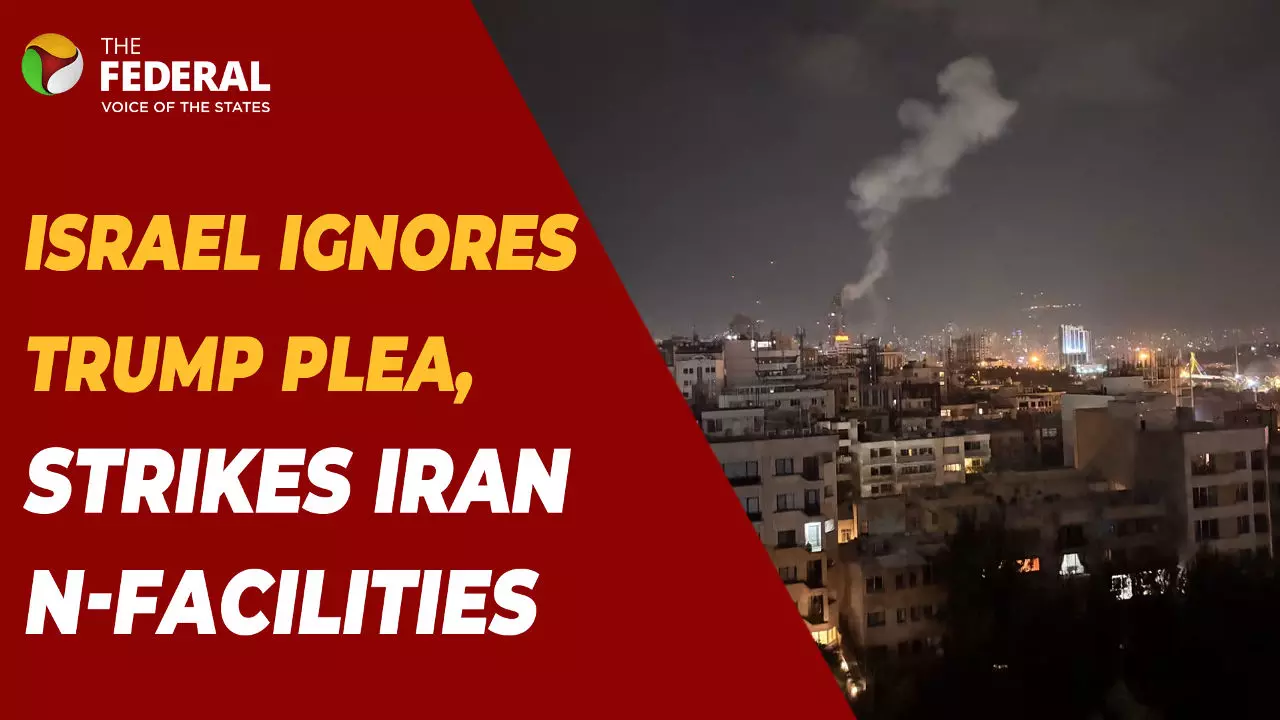
Israel Ignores Trump Plea
Why Israeli strike on Iran may not lead to wider conflict
Israel's surprise attack has hit multiple nuclear and military targets; as Iran vows retaliation and US distances itself, fears of a wider war are rising

In a sudden escalation, Israel has launched strikes on multiple Iranian sites, citing fears that Tehran is dangerously close to producing nuclear weapons. The move has reignited concerns about a broader conflict in the Middle East.
However, as of now, Iran is not in a position to mount a large-scale attack on Israel, mainly because of geographical distance and military limitations, says The Federal's Consulting Editor KS Dakshina Murthy.
Why did Israel strike Iran’s nuclear facilities?
One of the biggest issues in the Middle East, or West Asia, as we call it in India, has been the development of Iran’s nuclear programme. Israel and Iran have historically been on opposing sides, particularly after the 1979 Iranian Revolution. Since then, Israel has viewed Iran as an existential threat.
Over the past 25 years, Iran has advanced its nuclear program significantly. While the West claims Iran is pursuing nuclear capabilities for military purposes, Tehran has consistently stated it is for peaceful use.
The tipping point came after the International Atomic Energy Agency (IAEA) recently reported that Iran had enriched uranium to levels dangerously close to weapons-grade. This prompted Israel to act.
From Israel’s standpoint, Iran is the only country in the region with the capacity to pose a serious challenge. Since 1979, Iran has been openly hostile toward Israel’s existence. That’s why Israel sees this moment as critical.
Will this lead to an all-out conflict between the two nations?
One of the biggest worries right now is the potential for escalation. But it’s important to note that this isn’t the first time Israel has carried out such strikes. In the past, Israel has attacked not only Iran but also Iraq under Saddam Hussein and Syria’s nuclear facilities in 2007.
While it’s easy to blame Iran, the current situation is in part a consequence of the US pulling out of that agreement. Israel has consistently opposed any US engagement with Iran on this front and has instead preferred direct, military action — something we’re now witnessing again.
Israel maintains a consistent policy of preventing nuclear weapons development anywhere in the region. As of now, Iran is not in a position to mount a large-scale attack on Israel — mainly because of geographical distance and military limitations.
However, Iran will likely retaliate, as it did previously when Israel targeted senior Hamas leader Ismail Haniyeh in Tehran. Retaliation will likely take the form of missile strikes or similar limited responses. At the moment, it does not appear that the situation will spiral into a full-scale war.
Is the United States involved in Israel’s attack on Iran?
The United States is undoubtedly Israel’s biggest supporter. However, in this particular incident, the US claims it had no role in the strike.
This comes at a time when Iran and the US are actively engaged in nuclear negotiations. In fact, five rounds of talks have already taken place, with a sixth scheduled in Oman very soon. President Donald Trump, despite his hawkish image, has repeatedly emphasized resolving the issue through peaceful negotiation.
Interestingly, there has been tension between Trump and Israeli Prime Minister Benjamin Netanyahu over this very topic, sparking speculation. Though Washington supports Israel diplomatically and militarily, it insists it was not involved in this specific strike. Iran, however, argues that such an attack couldn’t have occurred without American logistical support.
The question now is whether Iran will retaliate against US military bases in the Middle East, as it has previously threatened.
What is the current status of Iran’s nuclear programme?
Iran began developing its nuclear programme around 25 years ago, originally to generate electricity. For peaceful purposes, uranium enrichment is typically kept below 4 per cent.
However, the IAEA has reported that Iran has now enriched uranium up to 60 per cent. While still below weapons-grade — typically above 90 per cent — this is alarmingly close.
Iran continues to maintain that its programme is non-military. But developments tell a different story. In 2015, a nuclear deal was struck between Iran and global powers. That deal was unilaterally abandoned in 2018 by President Trump, which triggered Iran to resume and accelerate uranium enrichment.
So, while it’s easy to blame Iran, the current situation is in part a consequence of the US pulling out of that agreement. Israel has consistently opposed any US engagement with Iran on this front and has instead preferred direct, military action — something we’re now witnessing again.
Will Iran continue with its nuclear roadmap despite the setback?
Despite the recent strike, Iran remains a major power in the region and is unlikely to abandon its nuclear ambitions.
Yes, this is a setback. But Iran has likely anticipated such actions from Israel. It also possesses underground nuclear facilities that remain inaccessible to Western inspectors, including the IAEA.
So while the recent attacks will delay or disrupt progress, they are unlikely to bring the program to a halt. Iran is likely to continue pursuing its nuclear roadmap—albeit more cautiously.
The content above has been transcribed from video using a fine-tuned AI model. To ensure accuracy, quality, and editorial integrity, we employ a Human-In-The-Loop (HITL) process. While AI assists in creating the initial draft, our experienced editorial team carefully reviews, edits, and refines the content before publication. At The Federal, we combine the efficiency of AI with the expertise of human editors to deliver reliable and insightful journalism.

